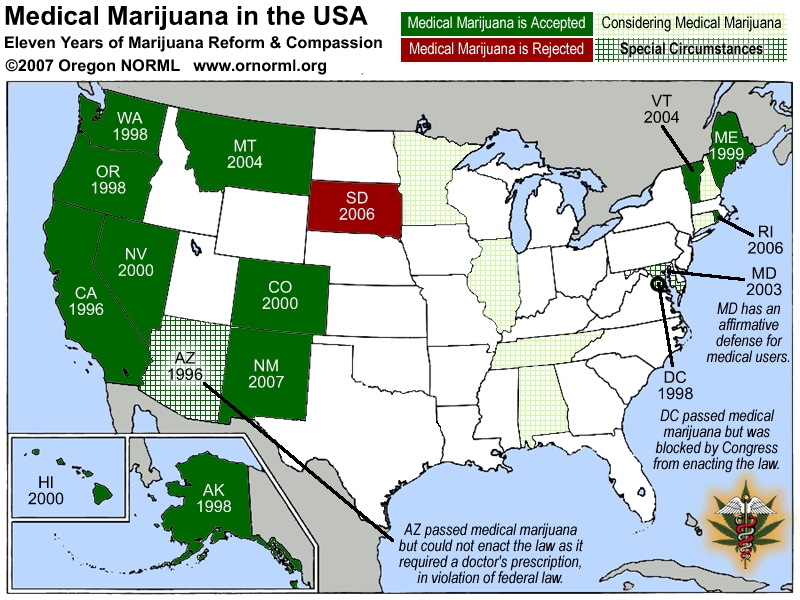Medical Marijuana Medical Conditions
Dr. Phillip Leveque Salem-News.com (OR) (7/3/2007)
To see the original source of this article click here
Medical Marijuana Medical Conditions
Phillip Leveque has spent his life as a Combat Infantryman, Physician and Toxicologist.
(MOLALLA, Ore.) - The disparate medical conditions for which marijuana/cannabis is effective is astonishing. It must mean that many of the physiological and/or pharmacological effects are on cell membranes despite the fact that there are at least two different receptors, CB-1 and CB-2. Cannabis seems to work everywhere.
The California law, Proposition 215, which launched the legal medical marijuana programs in the U.S. states, in part, that patients have the right to obtain and use marijuana for medical purposes where that medical use is deemed appropriate and has been recommended by a physician who has determined that the persons health would benefit from the use of marijuana in the treatment of cancer, anorexia, AIDS, chronic pain spasticity, glaucoma, arthritis, or any other illness for which marijuana provides relief. The last part of this paragraph has been found to be the most protective for both physicians and patients, and California physicians have found cannabis to be efficacious for many other diseases.
The medical marijuana journal/newspaper O’Shaughnessy, spring 2004, lists the following conditions for which the California physicians found marijuana use to be effective: (1) AIDS wasting syndrome, (2) arthritis, osteo- and rheumatoid, (3) asthma (while not burning cannabis), (4) Crohn’s disease/inflammatory bowel disease, (5) depression, (6) mental illness--schizophrenia (pro and con articles have been reported), (7) degenerative neural diseases, (8) eating disorders/anorexia, (9) epilepsy/seizures, (10) glaucoma, (11) intractable breathlessness, (12) migraine, (13) multiple sclerosis, (14) nausea and vomiting, (15) obstetric problems (dysmenorrheal, morning sickness, uterine bleeding, and antimiscarriage), (16) pain, of all types, (17) phantom limb pain, (18) tumors ( blockade of a carcinogenesis enzyme), and (19) withdrawal symptoms of alcoholism, morphinism, cocaine addiction, chloral hydrate addiction, etc. (and probably tobacco addiction).

California physicians have tried it for many other conditions on the basis that their patients told them it was effective. Some of them are: anxiety, PTSD, bipolar disorder, brain trauma, ADD, Obsessive-compulsive disorder, agoraphobia, panic attacks, Tourettes syndrome, gastroesophageal reflux, ulcerative colitis, gastritis, ulcers, celiac disease, pancreatitis, diverticulitis, lupus, spondylitis, scleroderma, psoriatic arthritis, interstital cystitis, Sjogrens, chronic fatigue, Bechets syndrome, polymyalgia rheumatica, optic neuritis, Lou Gehrigs disease, Parkinsons, Charcot-Marie-Tooth disease, senile dementia, sleep apnea, COPD, chronic sinusitis, and psoriasis.
It appears that the patients have become the practical pharmacologists because it is certain that no physician would have the therapeutic courage to try marijuana de novo for any of these last-mentioned diseases.
It reminds me what Dr. William Osler said, “The patient will tell you what’s wrong with them—and what works.”
It will take awhile before American physicians will be wise enough or brave enough to try the long used and broadly successful marijuana/cannabis as a first choice medicine.
I predict it will happen.
*******************************************************

Phillip Leveque is a physician, toxicologist and WWII Combat Infantryman.
You can email your questions to the doctor: newsroom@salem-news.com
Distributed without profit to those who have expressed a prior interest in
receiving the included information for research and educational purposes.
Top |
Home |
Mission |
Patient Resources |
Medical Uses |
News & Events |
Recipes
Search |
Message Board |
Gallery |
Contribute |
Links |
Contact Us
|
